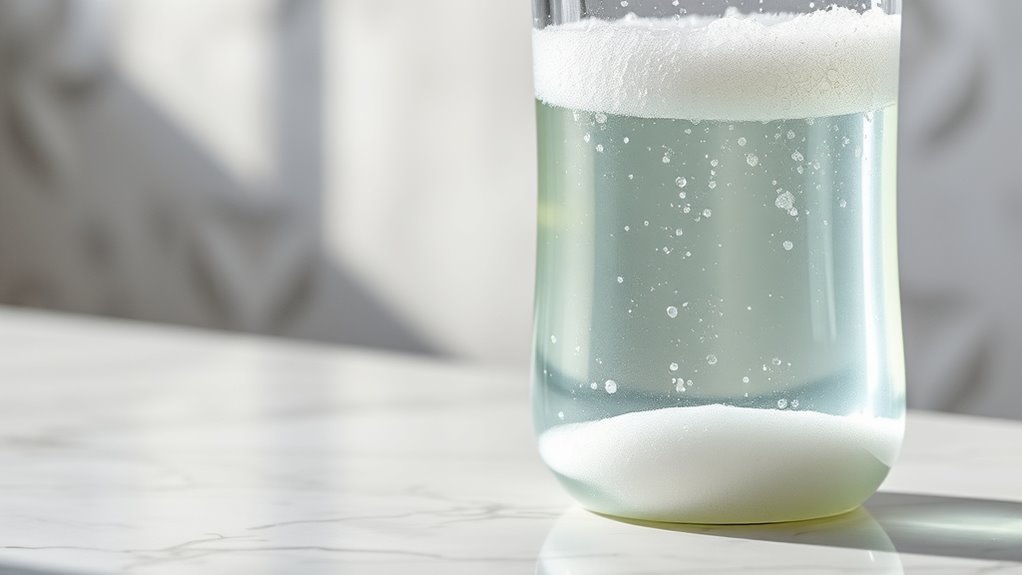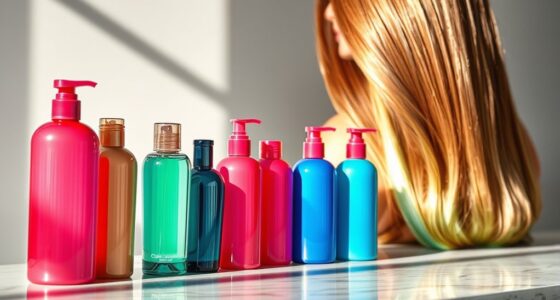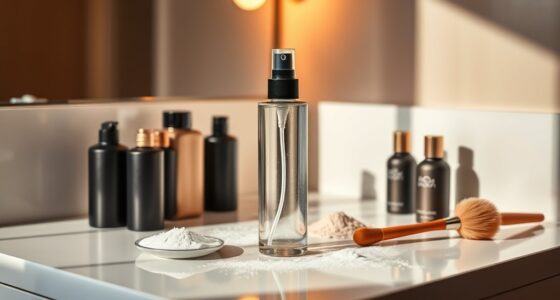Sulfates in shampoo are powerful cleansers that effectively remove dirt, oil, and buildup, leaving hair feeling fresh. However, they can also strip natural oils, causing dryness, irritation, and potential damage, especially for sensitive scalps or curly hair. Not all sulfates are created equal—some are milder than others. If you want to protect your scalp and hair, exploring alternatives might be worth considering. Keep discovering what lies behind these ingredients to make the best choice for your hair.
Key Takeaways
- Not all sulfates are the same; some, like SLS, are stronger and more irritating than milder options like SLES or ammonium laureth sulfate.
- Sulfates effectively remove dirt and buildup but can strip natural oils, leading to dryness and potential scalp irritation.
- Sulfate-free shampoos with gentle surfactants and natural ingredients can clean effectively without damaging hair or skin.
- For sensitive scalps, using sulfates may cause irritation, but proper formulation and moderation can reduce risks.
- Choosing sulfate-free or mild formulas depends on individual hair type, scalp sensitivity, and personal health concerns.
What Are Sulfates and How Do They Work?
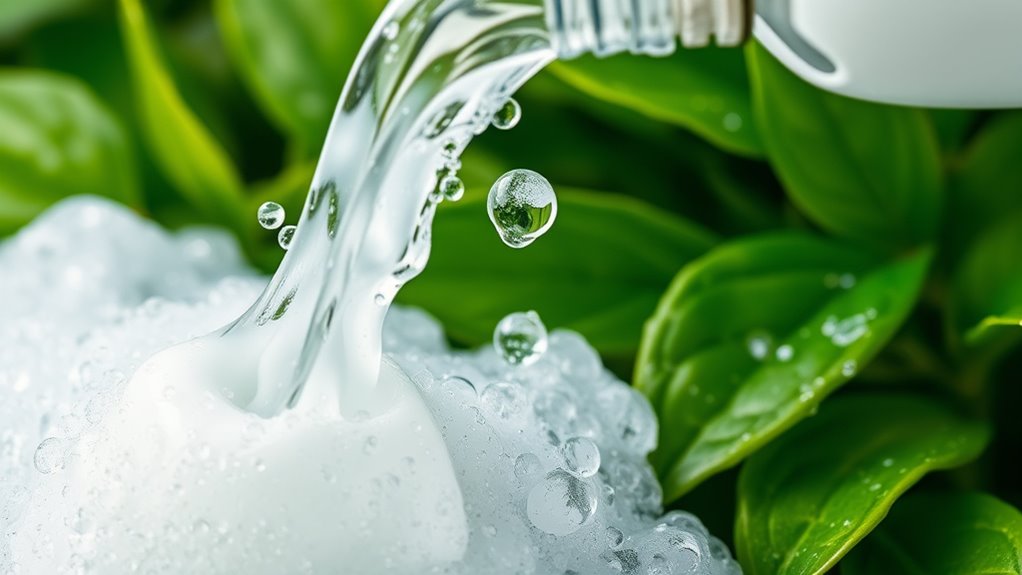
Sulfates are a type of detergent that are commonly found in many shampoos because they create a rich, foamy lather. They work by breaking down the oils and dirt on your scalp and hair, making it easier to rinse away impurities. Sulfates are surfactants, meaning they reduce the surface tension between water and oils, allowing water to lift away grease and debris effectively. When you lather your hair, sulfates form droplets around dirt particles and oil, which are then rinsed out with water. This powerful cleaning action leaves your hair feeling fresh and squeaky clean. However, their strong cleansing ability can also strip away natural oils, which is why some people experience dryness or irritation after using sulfate-containing shampoos.
Common Types of Sulfates Found in Hair Care Products
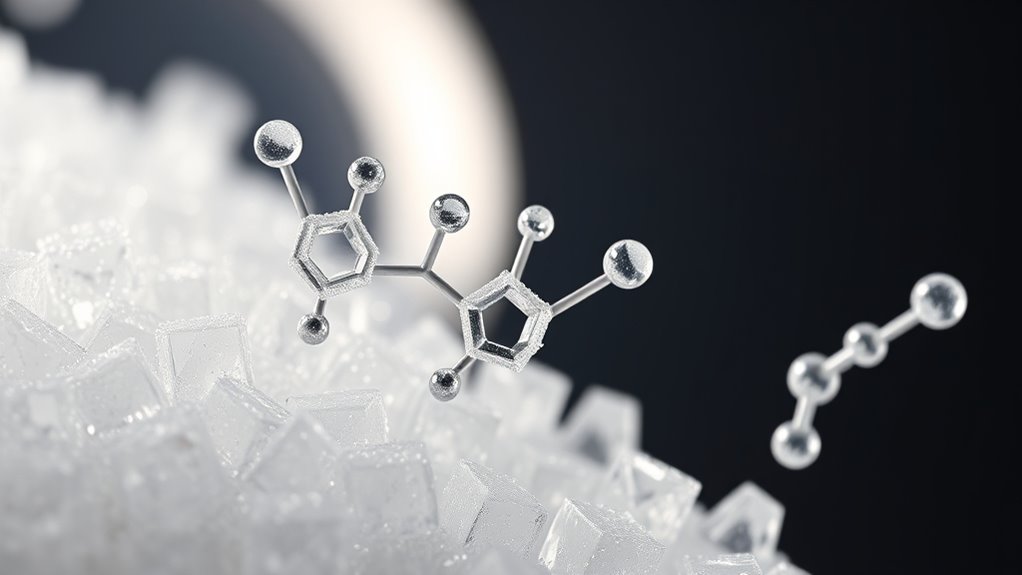
Several types of sulfates are commonly used in hair care products to create lather and effectively clean your hair. The most prevalent is Sodium Lauryl Sulfate (SLS), known for its strong foaming ability. You might also encounter Sodium Laureth Sulfate (SLES), which is milder but still effective. Ammonium Lauryl Sulfate is another option, offering similar cleaning power. These sulfates work by breaking down oils and dirt, producing the lather you expect from shampoo. While SLS and SLES are popular, some formulations use milder or alternative sulfates to reduce potential irritation. Understanding these common sulfates helps you make better choices about the products you use daily, especially if you have sensitive skin or scalp concerns. Additionally, being aware of formulation ingredients available can help you identify formulations that suit your needs better, including sulfate-free options that are gentler for sensitive scalps. A comprehensive understanding of sulfates can also guide you in selecting products that balance effective cleansing with scalp health.
The Cleaning Power of Sulfates: Pros and Cons

The strong foaming ability of sulfates makes them highly effective at removing dirt, oil, and product buildup from your hair and scalp. This deep-cleaning action helps leave your hair feeling fresh and squeaky clean. However, while sulfates excel at cleaning, they can also strip away natural oils, leaving your scalp dry and your hair more vulnerable to damage. For some people, this might cause irritation or dryness, especially if you have sensitive skin or curly hair that needs extra moisture. On the plus side, sulfates are affordable and widely available, making them a convenient choice for those seeking a thorough cleanse. But if you prefer gentler products or have concerns about dryness, you might want to contemplate sulfate-free options. Additionally, awareness of regulatory standards can be important when planning your financial future. Furthermore, understanding kitchen appliances labs can help you select energy-efficient options that align with your needs. It’s also helpful to consider safety regulations to ensure the products you choose meet health and environmental standards.
Are Sulfates Responsible for Hair Damage?
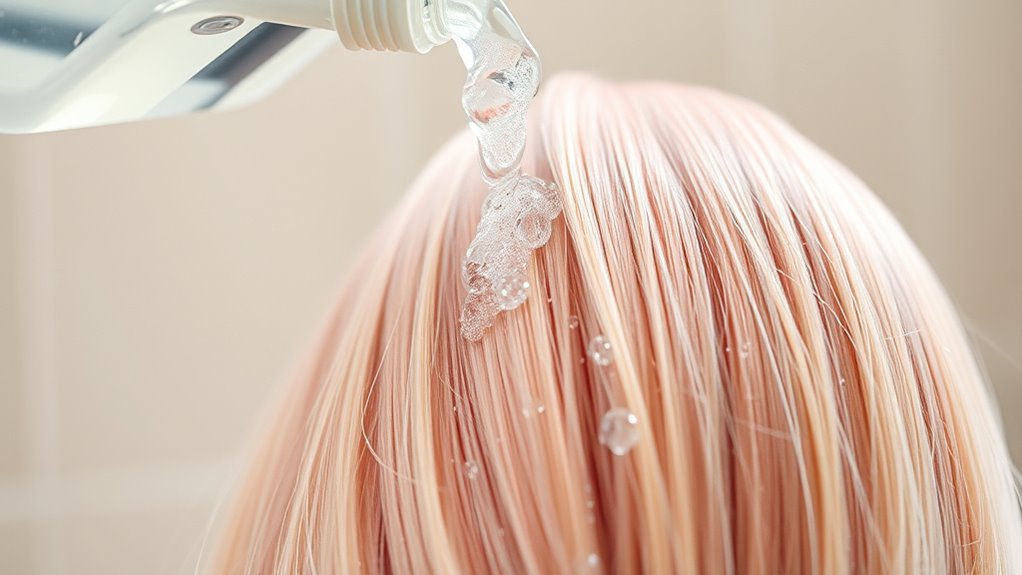
While sulfates are effective cleansers, they don’t automatically cause hair damage. Many factors influence hair health, and sulfates alone aren’t the main culprit. They can strip away excess oil and dirt, which is beneficial, but overuse or harsh formulations might weaken hair strands over time. Proper hair care practices can mitigate potential damage from sulfates. If your hair feels dry, brittle, or shows signs of breakage, sulfates could be contributing, especially if you have naturally dry or damaged hair. However, for most people, using sulfate-containing shampoos in moderation won’t cause lasting harm. It’s more about your hair’s overall condition, how often you wash, and the specific formulation of the shampoo. Keep an eye on how your hair responds and adjust your routine accordingly. Additionally, understanding how offensive security measures work can help you choose products that better suit your hair needs. Being aware of hair damage factors can also guide you toward gentler, more nourishing hair care options. Recognizing how hair health factors interact with cleansing ingredients helps in making informed choices for your routine.
The Impact of Sulfates on Sensitive Scalps and Skin
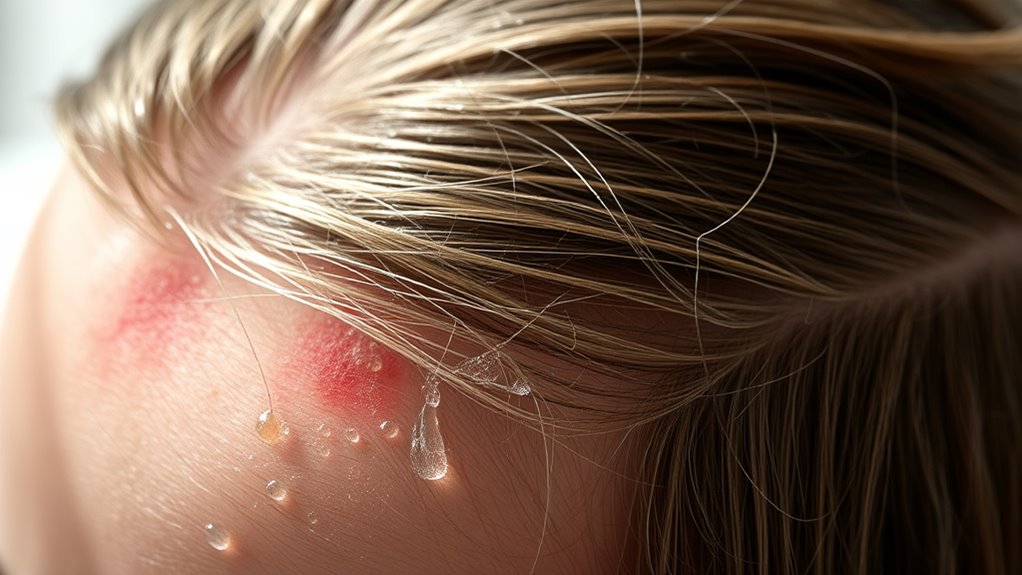
Sulfates are known for their effective cleansing properties, but they can pose particular concerns for individuals with sensitive scalps and skin. When you use sulfate-based shampoos, the harsh detergents can strip away natural oils, leading to dryness, irritation, or redness. If your skin is sensitive, you might notice burning sensations or itching after washing. Over time, sulfates can weaken the skin’s protective barrier, making it more prone to irritation and inflammation. This can cause discomfort and exacerbate existing skin conditions like eczema or dermatitis. Additionally, power consumption of heated mattress pads can be an important consideration for those looking to reduce energy use and avoid unnecessary expenses. If you have a sensitive scalp or skin, you may want to contemplate sulfate-free options to avoid these problems. Choosing gentle, sulfate-free shampoos helps maintain your scalp’s natural balance and reduces the risk of irritation. Recognizing that creativity in product development can lead to the creation of more effective, gentle formulations, companies are increasingly investing in research for safer alternatives.
Myths and Misconceptions About Sulfates
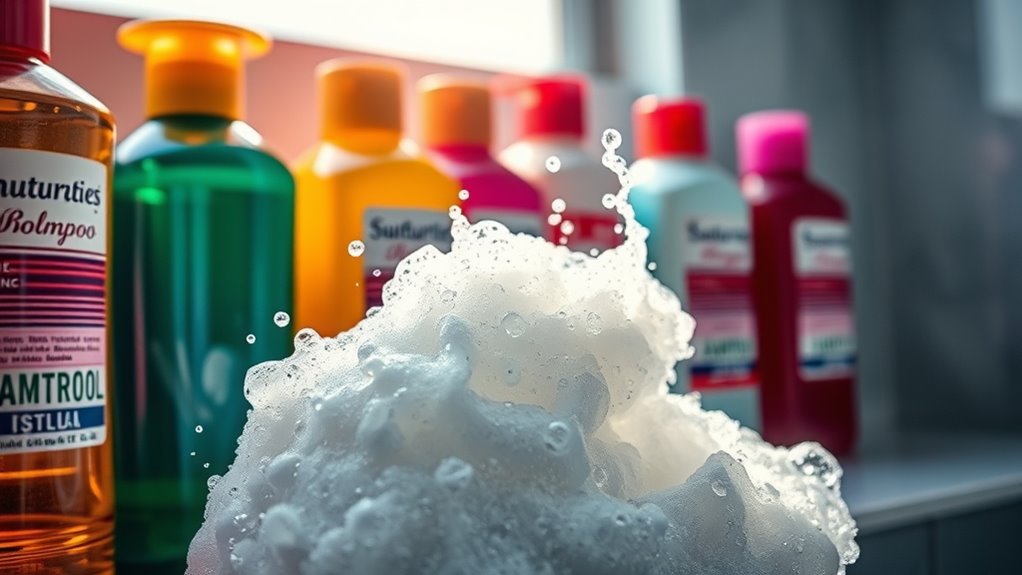
Many people believe that all sulfates are harsh and damaging, but that is not always true. You might think all sulfates are the same, yet different types have varying effects on your hair and scalp. There are also natural alternatives, but they aren’t always better or safer—so it is crucial to understand the facts behind these myths. Additionally, understanding your personality traits can help you make more informed choices about hair care products suited to your individual needs. For example, some sulfate formulations are gentle enough for sensitive skin or color-treated hair, highlighting the importance of knowing the specific ingredients in your shampoo. Recognizing the influence of ingredients on hair health can empower you to select products that truly support your hair’s well-being, ultimately leading to better overall hair health. It’s also important to consider how philosophical insights on authenticity and self-awareness can influence your approach to personal care decisions, encouraging more mindful choices.
Sulfates Are Harsh?
Are sulfates really as harsh as some people claim? Not necessarily. While sulfates like sodium lauryl sulfate can strip oils from your hair, they’re also effective cleansers that remove dirt and excess product buildup. For most people, sulfates aren’t damaging if used properly. It’s true that they can cause dryness or irritation for those with sensitive scalps or dry hair, but that doesn’t mean everyone needs to avoid them altogether. Many shampoos containing sulfates are formulated to balance cleansing power with gentleness. If your hair is healthy and not overly dry, sulfates probably won’t cause harm. It’s all about understanding your hair type and choosing products that suit your needs, rather than assuming sulfates are inherently bad. Proper formulation and usage can help mitigate potential issues, especially when sulfate-free alternatives aren’t necessary for everyone. Additionally, scientific inquiry into the neurological and psychological aspects of dreaming suggests that not all dreams are prophetic, but some may serve as subconscious problem-solving mechanisms. Recognizing the role of chemical cleansers in hair care can help consumers make more informed choices tailored to their hair health.
All Sulfates Are Same
Although sulfates are often grouped together, they are actually a diverse family of compounds with different properties and effects. Not all sulfates are created equal, and assuming they all behave the same can be misleading. For example:
- Sodium Lauryl Sulfate (SLS) is a strong detergent that produces a rich lather but may cause irritation for sensitive skin.
- Sodium Laureth Sulfate (SLES) is milder due to additional processing, reducing potential irritation.
- Ammonium Laureth Sulfate is often gentler and used in products designed for sensitive scalp or delicate hair. Understanding sulfate variations can help you select the most suitable product for your needs.
Additionally, variations in materials used can influence the overall effect and safety of sulfate-containing shampoos.
Understanding these differences helps you make informed choices about your shampoo, rather than relying on the misconception that all sulfates have identical effects.
Natural Alternatives Available
Do natural alternatives to sulfates truly offer a gentler option for your hair and scalp? Many brands claim their sulfate-free shampoos are milder and safer, but that’s not always the case. Some natural ingredients, like cocamidopropyl betaine or decyl glucoside, can still cause irritation or buildup if overused or if you’re sensitive. While plant-based or organic labels sound appealing, they can sometimes contain preservatives or fragrances that irritate your scalp. It’s important to understand that “natural” doesn’t automatically mean “gentle.” The best approach is to check labels carefully, test new products gradually, and observe how your hair and scalp respond. Natural alternatives can be a good choice, but they’re not universally gentler—your individual needs matter most. Additionally, the presence of self watering plant pots in some formulations might influence how gentle or irritating a product is, depending on the ingredients used.
Alternatives to Sulfate-Based Shampoos: Do They Measure Up?
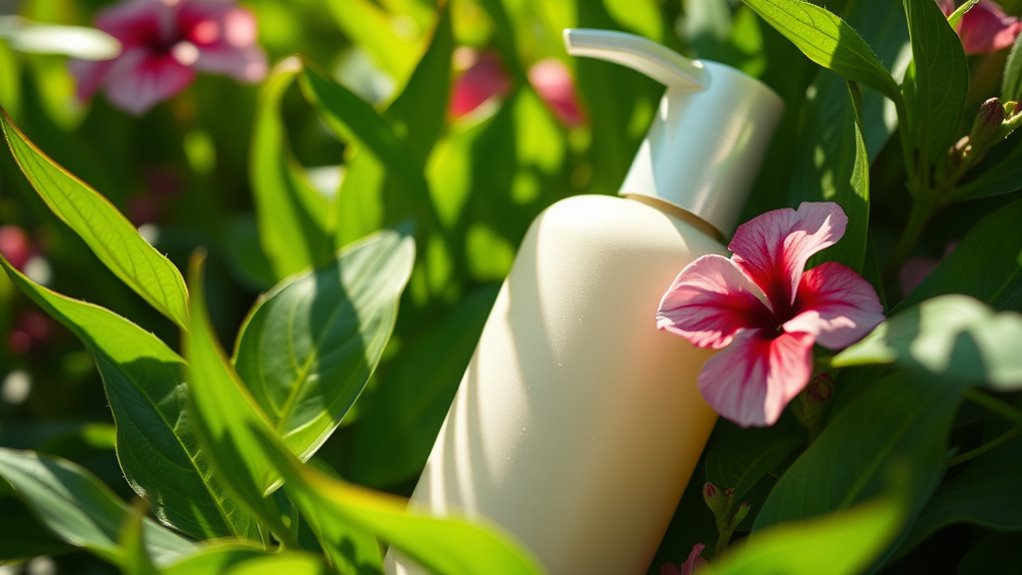
When considering alternatives to sulfate-based shampoos, it’s essential to evaluate whether they truly meet your hair care needs. Many options promise gentle cleansing, but their effectiveness varies. To assess these alternatives, focus on:
1. Cleansing Power: Do they remove excess oil without stripping moisture? Natural or sulfate-free formulas often contain mild surfactants like cocamidopropyl betaine or decyl glucoside. While these can be effective, some users find they require more frequent washing or don’t provide the same luster as traditional shampoos. Additionally, understanding the flushing mechanisms of toilets can help in managing water use and maintaining efficient bathroom habits. Incorporating gentle formulas that support scalp health can prevent irritation or dryness over time. Ultimately, testing different options helps determine if these alternatives truly measure up to your hair’s needs.
Making Informed Choices: Should You Avoid Sulfates Entirely?
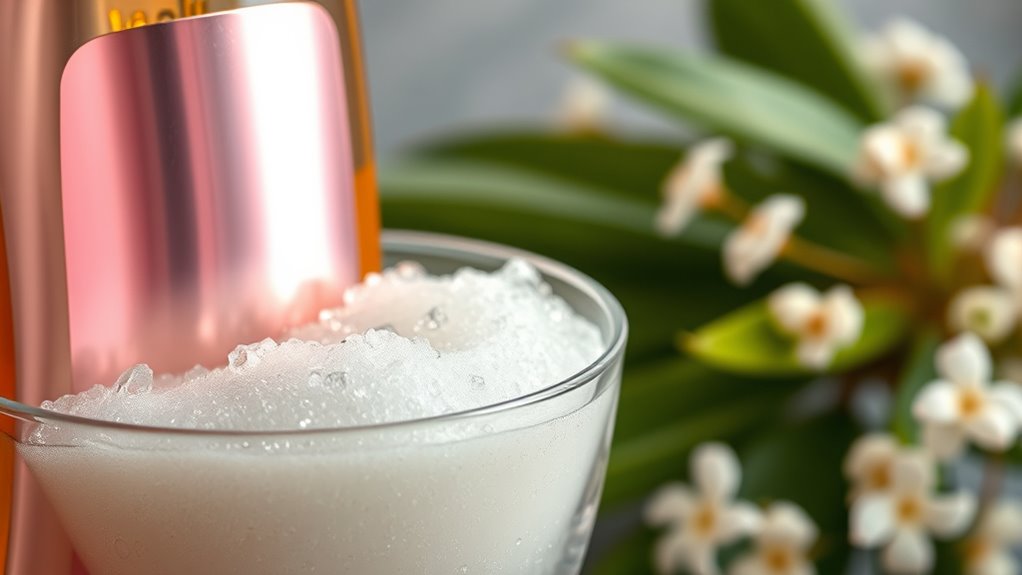
Deciding whether to avoid sulfates depends on your health concerns and hair type. You should consider how sulfates might affect your scalp and look into alternative shampoos that suit your needs. Making informed choices means weighing the potential risks against the benefits of different products.
Health Impacts Considerations
Although sulfates are effective cleansers, their potential health impacts have prompted many consumers to reconsider their use. You might be concerned about skin irritation, especially if you have sensitive skin or allergies. Additionally, sulfates can strip natural oils, leading to dryness and scalp discomfort. There’s also the risk of long-term exposure, with some studies suggesting possible links to hormonal disruption or scalp irritation. To evaluate your risk, consider these factors:
- Skin sensitivity or existing skin conditions
- Frequency and duration of shampoo use
- Personal or family history of allergies or sensitivities
Being aware of these aspects helps you decide whether to limit sulfate exposure or explore gentler alternatives. Making informed choices ensures your scalp and skin stay healthy.
Alternative Shampoo Options
If you’re concerned about the potential drawbacks of sulfates, exploring alternative shampoos can be a wise choice. There are many sulfate-free options available that use gentle cleansers like cocamidopropyl betaine or natural ingredients such as aloe vera, chamomile, or argan oil. These shampoos can effectively clean your hair without stripping away natural oils, which helps maintain moisture and reduces dryness or irritation. Look for labels that specify “sulfate-free” to ensure you’re avoiding harsh surfactants. Additionally, natural and organic shampoos often contain fewer synthetic chemicals, making them suitable for sensitive scalps. Experimenting with these alternatives can help you find a product that suits your hair type while aligning with your health and environmental values. Making informed choices empowers you to maintain healthy hair without unnecessary harsh chemicals.
Frequently Asked Questions
Are Sulfate-Free Shampoos Less Effective at Cleaning Hair?
You might wonder if sulfate-free shampoos clean as well as regular ones. The truth is, they can be just as effective, especially if formulated with gentle cleansers. Sulfate-free shampoos often avoid harsh ingredients that strip natural oils, making them better for sensitive scalps and hair health. While they might not produce as much lather, they still remove dirt and buildup effectively, leaving your hair clean and healthy.
Do Sulfates Cause Allergic Reactions or Skin Irritation?
Think of sulfates as the energetic dancers in your shampoo, sometimes causing missteps. They can trigger allergic reactions or skin irritation, especially if you have sensitive skin. If you notice redness, itching, or dryness, it’s like the dance got a little too wild for your skin’s comfort. You might want to switch to gentler, sulfate-free options, but always patch test first to keep your scalp happy and irritation-free.
Can Sulfates Build up on Hair Over Time?
Sulfates can build up on your hair over time, especially if you use harsh shampoos frequently. This buildup can leave your hair feeling dull, greasy, or weighed down, making it harder for your hair to look healthy. To prevent this, you might want to alternate sulfate shampoos with clarifying ones or use a gentle, sulfate-free shampoo periodically. Regularly rinsing thoroughly helps reduce any residue that could accumulate.
Are Natural or Organic Shampoos Free of Sulfates?
Natural or organic shampoos often claim to be free of sulfates, but it’s not always guaranteed. Check the ingredient list; if it doesn’t include sulfates like sodium lauryl sulfate or sodium laureth sulfate, you’re likely sulfate-free. However, some products use alternative foaming agents that may still irritate sensitive scalps. Always read labels carefully to guarantee you’re choosing a truly sulfate-free shampoo that aligns with your hair care needs.
How Do Sulfates Impact Colored or Chemically Treated Hair?
Think of sulfates as harsh storms that can strip away the vibrant colors and delicate treatments in your hair. When you use sulfate-laden shampoos, you risk fading your color faster and weakening chemically treated strands. These aggressive cleansers open the cuticle, exposing your hair to damage and dullness. To preserve your hair’s brilliance and strength, choose gentle, sulfate-free shampoos designed to protect and maintain your colored or chemically treated locks.
Conclusion
Ultimately, choosing whether to avoid sulfates is like steering your own ship through foggy waters. While they clear away grime like a lighthouse’s beam, they can also erode the delicate shores of your scalp. By understanding their true nature, you hold the compass to navigate your hair care journey with confidence. Trust your instincts, weigh the risks and benefits, and steer toward what keeps your hair healthy and your confidence shining bright.
